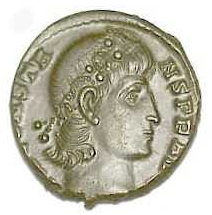Podcast: Play in new window | Download
Subscribe: Spotify | Email | RSS
 The eastern emperor and the western emperor agreed: there needed to be a new ecumenical council to somehow solve the theological disagreements festering from the controversy over Arius in 324-5. The Latin-speaking western bishops were simply not going to accept creeds like the ones from Antioch, even when repeatedly offered.
The eastern emperor and the western emperor agreed: there needed to be a new ecumenical council to somehow solve the theological disagreements festering from the controversy over Arius in 324-5. The Latin-speaking western bishops were simply not going to accept creeds like the ones from Antioch, even when repeatedly offered.
So in the year 342, it was decided to call together the bishops from all over the empire to neutral territory, to Serdica (Sardica), what is now modern-day Sophia, Bulgaria, which was on the far eastern edge of the western empire. The western emperor Constans was there, and at least 170 bishops arrived.
But no ecumenical meeting actually occurred! Still creeds were issued, and in this episode we hear from both, focusing on the long statement by the western bishops, the first real entry from the western, Latin-speaking side in these post-Nicea disputes. They choose to focus, in part, on Jesus’s statement in the gospel according to John that “the Father and I are one” and his prayer that his followers may be one as he and God are one.
You can also listen to this episode on Stitcher or iTunes (please subscribe, rate, and review us in either or both – directions here). It is also available on YouTube (you can subscribe here). If you would like to upload audio feedback for possible inclusion in a future episode of this podcast, put the audio file here.
You can support the trinities podcast by ordering anything through Amazon.com after clicking through one of our links. We get a small % of your purchase, even though your price is not increased. (If you see “trinities” in you url while at Amazon, then we’ll get it.)
- John 10; John 17
- Jesus’s argument in John 10
- podcast 30 – the council of Nicea
- Murray Harris, Jesus as God: The New Testament Use of Theos in Reference to Jesus
- poisoning the well fallacy
- A Gnome’s Tale
- John 14:25-30
- books quoted in this episode
- R.P.C. Hanson, The Search for the Christian Doctrine of God
- Leo Donald Davis, The First Seven Ecumenical Councils (325-787): Their History and Theology
- This week’s thinking music is “Labyrinth” by Sergey Cheremisinov.



This was really interesting. What comes out for me is the nastiness of the Western side plus Athanasius as against the earnestness of the Eastern side. The Easterners trying to be consistent subordinationists, the Westerners wilfully misunderstanding the Easterners ‘hypostasis’.
Great Episode, sometimes People make the mistake of thinking that ancients were not as intelligent as we are today, but sometimes it’s the other way around, sometimes I assume when Reading ancient texts that People were smarter and deeper, more spiritual and philsophical than today, but it’s interesting that even in the early days bad arguments, Church politics, and cheap shots were as common as they are today.
I feel like a Whole lot of what has become Christian Orthodoxy started out as just Word games made to argue against people and ideas and exclude them.
Comments are closed.